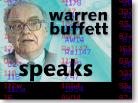|
Buffett dumps zero bonds
|
 |
August 3, 1998: 4:07 p.m. ET
Mogul's move spurs 323 percent surge in Berkshire Hathaway's 2Q profit
|
NEW YORK (CNNfn) - Berkshire Hathaway, the holding company that doubles as an investment vehicle for mogul Warren Buffett, said Monday it has dumped all of its U.S. government long-term zero-coupon bonds.
The move fueled a 323 percent surge in second-quarter earnings, driven primarily by after-tax investment gains of $864 million in the second-quarter and $1.334 billion in the first half from the bond sale.
The unloading of the zero coupons heralds an exit from an investment that Buffett -- who built his fortune and reputation by plowing money into high-growth equities, rather than paper debt -- had ambivalent feelings about from the start.
Zero coupons, also known as "zeros," are sold at deep discounts and pay no cash interest until maturity. The bonds may be particularly enticing to investors who believe there will be a decline in interest rates, since the absence of interest payments removes any reinvestment risk associated with other types of bonds.
From 1967 to 1997, Buffett has realized average annual returns of 25.6 percent on his investments, which are weighted heavily in favor of big capitalization stocks. At the end of 1997, Buffett had $4.6 billion in zero coupons.
Consequently, Berkshire Hathaway has accumulated significant minority stakes in such corporate heavyweights as American Express, Coca-Cola, Gillette, Walt Disney, Washington Post Co. and Wells Fargo.
The zero coupon Treasury securities were one of three "non-conventional" investments Buffett had made in the past year, along with forays into oil and silver. Buffett never bothered to hide the fact that he resorted to the bond investments only in the absence of more gainful alternatives in the equity market.
'Nothing recedes like success'
In his annual letter to shareholders March 14, Buffett said he believed stock-price levels were eroding the 'margin of safety,' making it harder to get a good return on investments. "For anyone deploying capital," he warned, "nothing recedes like success."
In purchasing "zeros," Buffett cautioned investors in March, "a macro-based commitment such as this never has anything close to a 100 percent chance of being successful."
Nonetheless, by relinquishing the bonds, Buffett gave Berkshire an immediate profit injection.
Berkshire said its second-quarter net income rose to $1.176 billion, or $947 a share, from $278 million, or $226 a share, a year ago.
The figures included after-tax investment gains of $864 million in the second quarter, and $1.334 billion in the first half making them, according to Berkshire Hathaway, "meaningless" in evaluating the company..
By contrast, the company posted investment gains of $23 million in the second quarter of 1997, and $44 million through the first six months.
"While the realized gains had a material impact on Berkshire's 1998 reported earnings," the company said, "they had a very minor impact on Berkshire's shareholders' equity."
The company, based in Omaha, Neb., operates property, casualty and reinsurance businesses through subsidiaries that include National Indemnity and Geico.
In the public eye, however, Berkshire is synonymous with Buffett, whose stock-picking acumen has made him the nation's second wealthiest man, after Bill Gates. Yet he's more than just another multi-billionaire to Berkshire's own investors, who idolize him as a font of first-hand investment wisdom that Buffett has rarely been shy about sharing.
Partly for that reason, Buffett's market moves -- no matter how seemingly trivial -- become the object of outsized scrutiny. When Buffet went on a buying spree last year in the silver market, snatching up 111.2 million ounces and producing a year-end profit gain of $95 million, the gambit sparked a worldwide rally in the precious commodity that only recently fizzled.
In a statement Monday, Berkshire Hathaway gave no reason for the company's -- and by extension, Buffett's -- decision to dump the zero-coupon obligations.
Not Buffett's cup of tea
Instead, the company merely stated that "a substantial portion of 1998's second-quarter gain resulted from the sale of Berkshire's entire position in zero-coupon obligations of the U.S. government."
Hugh Johnson, the chief investment officer with First Albany, suggested that it would have been surprising if Buffett had chosen to hold on to the bonds indefinitely.
"It's uncharacteristic of him to make big-picture investments," Johnson said. "This whole area -- zero coupons, silver -- when he seems to depart from big companies, he feels uncomfortable, it's not his place…he's sort of saying to himself, 'this is not my cup of tea.'"
Berkshire said Monday that Geico, the company's largest unit, had contributed significantly to the earnings gain, with an underwriting profit margin of 8 percent in the second quarter.
Berkshire's common stock trades on the New York Stock exchange under separate ticker symbols -- (BRK.A) and (BRK.B) -- for its class-A and class-B shares. Berkshire A-stock was trading up 795 at 70,900 Monday, while class-B shares climbed 26 to 2,368. 
|
|
|
|
|
|
Berkshire Hathaway
|
Note: Pages will open in a new browser window
External sites are not endorsed by CNNmoney
|
|
|
|
 |

|

